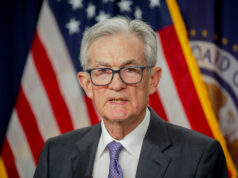New York Federal Reserve sees light demand for extra $500B in overnight repo
NEW YORK — The New York Federal Reserve saw light demand for an additional $500 billion in support to overnight lending markets on Monday, even after a spike in the cost of overnight loans indicated that companies were still feeling funding strains.
Primary dealers took only $19.40 billion of the loans on offer at the overnight repurchase agreement (repo) operation.
The added support was meant to “ensure that the supply of reserves remain ample and to support the smooth functioning of short-term US dollar funding market,” the New York Fed said in a statement Monday.
Investors and regulators have been alarmed, in particular, by liquidity problems in the $17- trillion US Treasuries market. Large and unusually quick swings in yields are making it hard for investors to execute orders, as are persistently large spreads between bid and ask prices on individual securities.
In addition to slashing rates to near zero, the Fed announced on Sunday evening that it would purchase an additional $700 billion in Treasury securities and mortgage-backed securities to improve market functioning.
Fed Chair Jerome Powell said the central bank decided to purchase more Treasury bonds and mortgage-backed securities after noting that the large repo operations announced last week were not doing enough to keep markets liquid.
“These markets are part of the foundation of the global financial system and of the United States financial system,” Mr. Powell said during a press call with reporters Sunday night. “If they are not functioning well then that will spread to other markets.”
The rate on overnight repo loans jumped to 2% on Monday morning in volatile trading before the Fed announced the latest repo operation. It dropped to 1% after the announcement and to 0.05% later on Monday.
The Fed’s efforts over the weekend also appear to have failed to temper a global scramble for US dollar financing. Loans remained expensive in offshore markets, with Japanese banks paying a premium of 173 basis points to swap yen for one-month dollars, almost a tenfold climb over the average price in the past year. — Reuters



